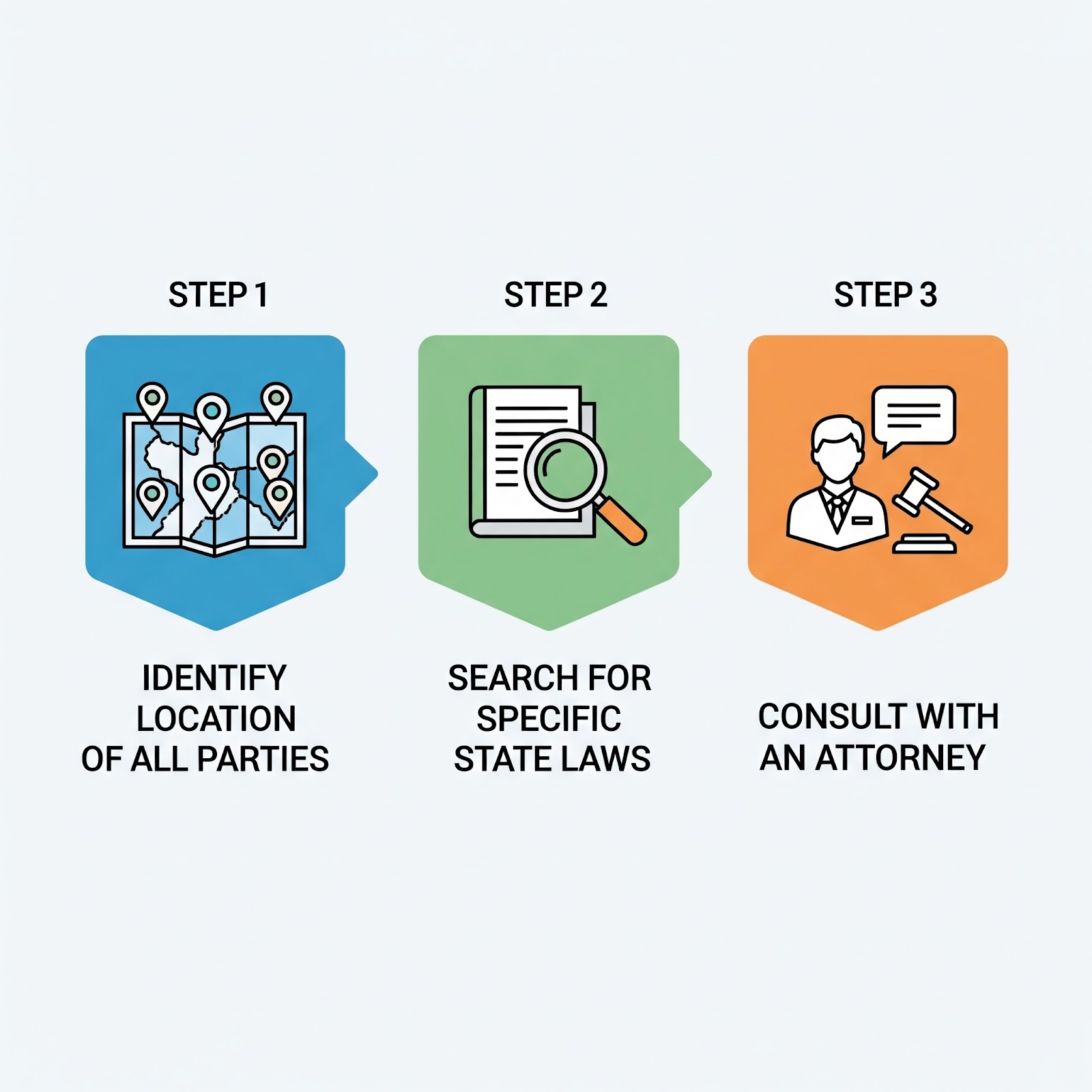In the hectic pace of business, particularly for sales forces, recording calls can be a goldmine of value. It is an excellent method for ensuring quality, training new hires, and having a solid record of customer contact. However, before you press "record," it is important to become familiar with the legal landscape regarding call recording. The legislation is not one-size-fits-all, and what is acceptable in one state may be a crime of import in another.
This guide will assist you in learning the fundamentals of how to verify call recording laws in the U.S. and conduct compliant business.
The Foundation: Federal Call Recording Laws
The first thing that needs to be taken into consideration is the federal call recording laws. The Federal Wiretap Act of 1968 and the Electronic Communications Privacy Act (ECPA) of 1986 are the most significant laws at the federal level. Under this law, it is legal to record a call if one of the parties on the call provides consent. This is known as the "one-party consent rule”.
But that is just for starters. State laws can, and most frequently do, become more stringent.
State Call Recording Consent Statutes: One-Party vs. All-Party
For state call recording consent laws, there are two general categories that you should be aware of:
- One-Party Consent States: The majority of states in the U.S. employ the one-party consent standard, which is identical to American federal law. According to the one-party consent standard, you can lawfully tape a call as long as you are a party on the call, even if the other party is unaware. Matthiesen, Wickert & Lehrer, S.C., being a law firm, indicates that 38 states and the District of Columbia belong to this group.
- All-Party Consent States: There is a lesser but significant group of states that demand that all parties consent to the recording. This includes having to advise all parties to the call that the call is being recorded and obtaining their clear assent to continue.
It's important to note that these laws are often part of broader wiretapping laws by the state or privacy laws for phone calls. The specific language may vary, but the intent is to protect individuals from unauthorized surveillance.
A Short List of All-Party Agreement States
Though the list can be changed and judicial interpretations vary, the following are generally considered "all-party consent" or "two-party consent" states:
- California
- Connecticut
- Delaware
- Florida
- Illinois
- Maryland
- Massachusetts
- Montana
- Nevada
- New Hampshire
- Pennsylvania
- Washington
Oregon and Hawaii have complicated or blended laws on whether the conversation is in person or through the phone.
How to Obtain Your State's Call Recording Laws

Therefore, how do you best locate the U.S. audio recording laws in your specific case?
- Identify the Location of All Parties: The first and most important thing to do is to identify the location of all parties to the call. If you are in an all-party consent jurisdiction and the other party is in a one-party consent jurisdiction, the stricter law (all-party consent) tends to win.
- Search For Specific State Laws: Try to utilize phrases such as "Is it legal to record a conversation in [state]" or "[State Name] telephone recording consent laws." You would be searching for information from government sites, established legal practices, or legal reference materials.
- Speak to an Attorney: For any business, especially one that makes a lot of call recordings, the best and most secure option is to speak to an attorney. An attorney can provide advice according to your business locations and operations.
One of the overall principles is to default to the most restrictive law in all instances. In the case of doubt, obtain consent from all parties on the call.
The Significance of Seeking Permission
In all-party consent schemes, it is not courtesy to obtain consent; it is the law. The best and most sensible means of doing so is by an audible announcement on call initiation, e.g.: "This call is being recorded for quality and training purposes. By remaining on this call, you agree to the recording."
This opt-out solution is an efficient way of complying with a wide range of telephone recording consent laws. This forward-thinking strategy is especially applicable in that 46% of customers are highly likely to stop shopping from a business if their calls consistently go unanswered and other support is not provided.
The Consequences of Non-Compliance
Not following state and federal call recording laws isn’t just a small slip-up; it can land you in serious trouble. The fallout can be legal, financial, and reputational, and it often depends on where you are and how the law views your actions.
- Criminal Charges: In many all-party consent states, secretly recording a conversation can be treated as a felony. That’s not just a fine; it can mean prison time. For example, under federal law, illegal wiretapping can carry up to five years in prison, while in Illinois, the maximum sentence can reach seven years.
- Civil Lawsuits: Beyond criminal charges, the person you recorded without permission could take you to court. Some states even set a fixed penalty amount. In California, for instance, the victim can claim $5,000 for every single violation.
- Inadmissible Evidence: Here’s the kicker, even if you thought the recording would protect you in a dispute, if it was obtained illegally, it’s usually useless in court. Judges often throw out such evidence, leaving you without the very proof you were counting on and with the added risk of penalties.
Conclusion: Call Recording Laws Handled with Ease
The law around call recording can be complex, but it does not have to be a barrier. Understanding the distinction between all- and one-party consent, and always erring on the side of caution, will enable you to utilize call recording as a valuable tool while remaining compliant.
For sales teams, call recording, transcription, and analysis are a game-changer. They enable you to better understand the needs of the customer and close more deals. A Forrester survey finds that 48% of marketers expect to enhance customer experiences by utilizing conversation intelligence solutions. That's where Pepsales AI comes in. Our platform is designed to be seamless in your sales process, providing call insights and analytics, and keeping you up to date with the laws that you need to comply with. With Pepsales AI, you are empowered to succeed, and the peace of mind that comes with knowing that your call recording strategy is ethical and informed.
Ready to revolutionize your sales process without sacrificing compliance?
Get a Personalized Demo of Pepsales AI Today!
FAQ
1. Is it legal to record a sales call without telling the other person?
It depends on where you and the other person are located. Some states require all parties to consent; always check before recording.
2. What’s the safest way to stay compliant?
When in doubt, announce the recording at the start of the call and get verbal agreement from everyone.
3. Can I use an illegally recorded call in court?
Usually no. Most courts will throw it out, and you could face fines or even criminal charges.
4. How can Pepsales AI help with compliance?
Pepsales AI keeps you informed about recording laws and ensures your call strategy stays both effective and legal.









.avif)
.avif)
.avif)
